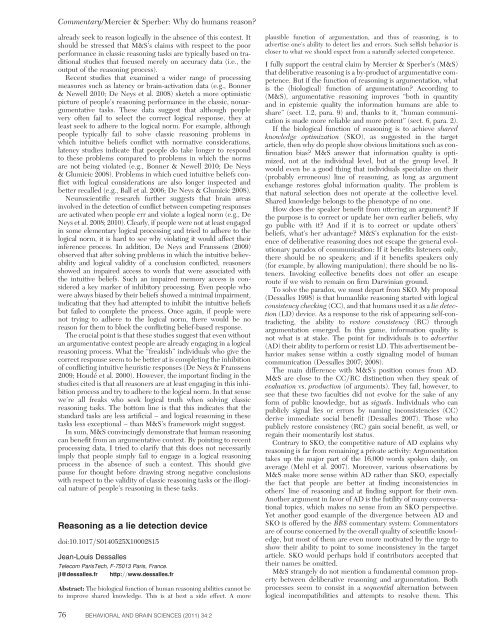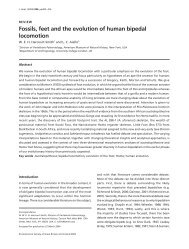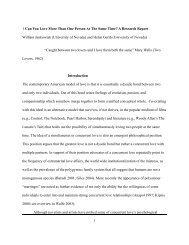Why do humans reason? Arguments for an argumentative theory
Why do humans reason? Arguments for an argumentative theory
Why do humans reason? Arguments for an argumentative theory
Create successful ePaper yourself
Turn your PDF publications into a flip-book with our unique Google optimized e-Paper software.
Commentary/Mercier & Sperber: <strong>Why</strong> <strong>do</strong> <strong>hum<strong>an</strong>s</strong> <strong>reason</strong>?already seek to <strong>reason</strong> logically in the absence of this context. Itshould be stressed that M&S’s claims with respect to the poorper<strong>for</strong>m<strong>an</strong>ce in classic <strong>reason</strong>ing tasks are typically based on traditionalstudies that focused merely on accuracy data (i.e., theoutput of the <strong>reason</strong>ing process).Recent studies that examined a wider r<strong>an</strong>ge of processingmeasures such as latency or brain-activation data (e.g., Bonner& Newell 2010; De Neys et al. 2008) sketch a more optimisticpicture of people’s <strong>reason</strong>ing per<strong>for</strong>m<strong>an</strong>ce in the classic, non<strong>argumentative</strong>tasks. These data suggest that although peoplevery often fail to select the correct logical response, they atleast seek to adhere to the logical norm. For example, althoughpeople typically fail to solve classic <strong>reason</strong>ing problems inwhich intuitive beliefs conflict with normative considerations,latency studies indicate that people <strong>do</strong> take longer to respondto these problems compared to problems in which the normsare not being violated (e.g., Bonner & Newell 2010; De Neys& Glumicic 2008). Problems in which cued intuitive beliefs conflictwith logical considerations are also longer inspected <strong>an</strong>dbetter recalled (e.g., Ball et al. 2006; De Neys & Glumicic 2008).Neuroscientific research further suggests that brain areasinvolved in the detection of conflict between competing responsesare activated when people err <strong>an</strong>d violate a logical norm (e.g., DeNeys et al. 2008; 2010). Clearly, if people were not at least engagedin some elementary logical processing <strong>an</strong>d tried to adhere to thelogical norm, it is hard to see why violating it would affect theirinference process. In addition, De Neys <strong>an</strong>d Fr<strong>an</strong>ssens (2009)observed that after solving problems in which the intuitive believability<strong>an</strong>d logical validity of a conclusion conflicted, <strong>reason</strong>ersshowed <strong>an</strong> impaired access to words that were associated withthe intuitive beliefs. Such <strong>an</strong> impaired memory access is considereda key marker of inhibitory processing. Even people whowere always biased by their beliefs showed a minimal impairment,indicating that they had attempted to inhibit the intuitive beliefsbut failed to complete the process. Once again, if people werenot trying to adhere to the logical norm, there would be no<strong>reason</strong> <strong>for</strong> them to block the conflicting belief-based response.The crucial point is that these studies suggest that even without<strong>an</strong> <strong>argumentative</strong> context people are already engaging in a logical<strong>reason</strong>ing process. What the “freakish” individuals who give thecorrect response seem to be better at is completing the inhibitionof conflicting intuitive heuristic responses (De Neys & Fr<strong>an</strong>ssens2009; Houdé et al. 2000). However, the import<strong>an</strong>t finding in thestudies cited is that all <strong>reason</strong>ers are at least engaging in this inhibitionprocess <strong>an</strong>d try to adhere to the logical norm. In that sensewe’re all freaks who seek logical truth when solving classic<strong>reason</strong>ing tasks. The bottom line is that this indicates that thest<strong>an</strong>dard tasks are less artificial – <strong>an</strong>d logical <strong>reason</strong>ing in thesetasks less exceptional – th<strong>an</strong> M&S’s framework might suggest.In sum, M&S convincingly demonstrate that hum<strong>an</strong> <strong>reason</strong>ingc<strong>an</strong> benefit from <strong>an</strong> <strong>argumentative</strong> context. By pointing to recentprocessing data, I tried to clarify that this <strong>do</strong>es not necessarilyimply that people simply fail to engage in a logical <strong>reason</strong>ingprocess in the absence of such a context. This should givepause <strong>for</strong> thought be<strong>for</strong>e drawing strong negative conclusionswith respect to the validity of classic <strong>reason</strong>ing tasks or the illogicalnature of people’s <strong>reason</strong>ing in these tasks.Reasoning as a lie detection device<strong>do</strong>i:10.1017/S0140525X10002815Je<strong>an</strong>-Louis DessallesTelecom ParisTech, F-75013 Paris, Fr<strong>an</strong>ce.jl@dessalles.fr http://www.dessalles.frAbstract: The biological function of hum<strong>an</strong> <strong>reason</strong>ing abilities c<strong>an</strong>not beto improve shared knowledge. This is at best a side effect. A moreplausible function of argumentation, <strong>an</strong>d thus of <strong>reason</strong>ing, is toadvertise one’s ability to detect lies <strong>an</strong>d errors. Such selfish behavior iscloser to what we should expect from a naturally selected competence.I fully support the central claim by Mercier & Sperber’s (M&S)that deliberative <strong>reason</strong>ing is a by-product of <strong>argumentative</strong> competence.But if the function of <strong>reason</strong>ing is argumentation, whatis the (biological) function of argumentation? According to(M&S), <strong>argumentative</strong> <strong>reason</strong>ing improves “both in qu<strong>an</strong>tity<strong>an</strong>d in epistemic quality the in<strong>for</strong>mation <strong>hum<strong>an</strong>s</strong> are able toshare” (sect. 1.2, para. 9) <strong>an</strong>d, th<strong>an</strong>ks to it, “hum<strong>an</strong> communicationis made more reliable <strong>an</strong>d more potent” (sect. 6, para. 2).If the biological function of <strong>reason</strong>ing is to achieve sharedknowledge optimization (SKO), as suggested in the targetarticle, then why <strong>do</strong> people show obvious limitations such as confirmationbias? M&S <strong>an</strong>swer that in<strong>for</strong>mation quality is optimized,not at the individual level, but at the group level. Itwould even be a good thing that individuals specialize on their(probably erroneous) line of <strong>reason</strong>ing, as long as argumentexch<strong>an</strong>ge restores global in<strong>for</strong>mation quality. The problem isthat natural selection <strong>do</strong>es not operate at the collective level.Shared knowledge belongs to the phenotype of no one.How <strong>do</strong>es the speaker benefit from uttering <strong>an</strong> argument? Ifthe purpose is to correct or update her own earlier beliefs, whygo public with it? And if it is to correct or update others’beliefs, what’s her adv<strong>an</strong>tage? M&S’s expl<strong>an</strong>ation <strong>for</strong> the existenceof deliberative <strong>reason</strong>ing <strong>do</strong>es not escape the general evolutionarypara<strong>do</strong>x of communication: If it benefits listeners only,there should be no speakers; <strong>an</strong>d if it benefits speakers only(<strong>for</strong> example, by allowing m<strong>an</strong>ipulation), there should be no listeners.Invoking collective benefits <strong>do</strong>es not offer <strong>an</strong> escaperoute if we wish to remain on firm Darwini<strong>an</strong> ground.To solve the para<strong>do</strong>x, we must depart from SKO. My proposal(Dessalles 1998) is that hum<strong>an</strong>like <strong>reason</strong>ing started with logicalconsistency checking (CC), <strong>an</strong>d that <strong>hum<strong>an</strong>s</strong> used it as a lie detection(LD) device. As a response to the risk of appearing self-contradicting,the ability to restore consistency (RC) throughargumentation emerged. In this game, in<strong>for</strong>mation quality isnot what is at stake. The point <strong>for</strong> individuals is to advertise(AD) their ability to per<strong>for</strong>m or resist LD. This advertisement behaviormakes sense within a costly signaling model of hum<strong>an</strong>communication (Dessalles 2007; 2008).The main difference with M&S’s position comes from AD.M&S are close to the CC/RC distinction when they speak ofevaluation vs. production (of arguments). They fail, however, tosee that these two faculties did not evolve <strong>for</strong> the sake of <strong>an</strong>y<strong>for</strong>m of public knowledge, but as signals. Individuals who c<strong>an</strong>publicly signal lies or errors by naming inconsistencies (CC)derive immediate social benefit (Dessalles 2007). Those whopublicly restore consistency (RC) gain social benefit, as well, orregain their momentarily lost status.Contrary to SKO, the competitive nature of AD explains why<strong>reason</strong>ing is far from remaining a private activity: Argumentationtakes up the major part of the 16,000 words spoken daily, onaverage (Mehl et al. 2007). Moreover, various observations byM&S make more sense within AD rather th<strong>an</strong> SKO, especiallythe fact that people are better at finding inconsistencies inothers’ line of <strong>reason</strong>ing <strong>an</strong>d at finding support <strong>for</strong> their own.Another argument in favor of AD is the futility of m<strong>an</strong>y conversationaltopics, which makes no sense from <strong>an</strong> SKO perspective.Yet <strong>an</strong>other good example of the divergence between AD <strong>an</strong>dSKO is offered by the BBS commentary system: Commentatorsare of course concerned by the overall quality of scientific knowledge,but most of them are even more motivated by the urge toshow their ability to point to some inconsistency in the targetarticle. SKO would perhaps hold if contributors accepted thattheir names be omitted.M&S str<strong>an</strong>gely <strong>do</strong> not mention a fundamental common propertybetween deliberative <strong>reason</strong>ing <strong>an</strong>d argumentation. Bothprocesses seem to consist in a sequential alternation betweenlogical incompatibilities <strong>an</strong>d attempts to resolve them. This76 BEHAVIORAL AND BRAIN SCIENCES (2011) 34:2




